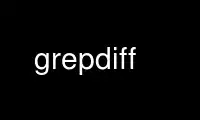
This is the command grepdiff that can be run in the OnWorks free hosting provider using one of our multiple free online workstations such as Ubuntu Online, Fedora Online, Windows online emulator or MAC OS online emulator
PROGRAM:
NAME
grepdiff - show files modified by a diff containing a regex
SYNOPSIS
grepdiff [[-n] | [--line-number]] [[-N] | [--number-files]] [[-p n] | [--strip-match=n]]
[--strip=n] [--addprefix=PREFIX] [--addoldprefix=PREFIX] [--addnewprefix=PREFIX]
[[-s] | [--status]] [[-i PATTERN] | [--include=PATTERN]] [[-I FILE] |
[--include-from-file=FILE]] [[-x PATTERN] | [--exclude=PATTERN]] [[-X FILE] |
[--exclude-from-file=FILE]] [[-# RANGE] | [--hunks=RANGE]] [--lines=RANGE]
[[-FRANGE] | [--files=RANGE]] [--annotate] [--as-numbered-lines=WHEN]
[--format=FORMAT] [--remove-timestamps] [[-v] | [--verbose]] [[-z] |
[--decompress]] [[-E] | [--extended-regexp]] [[-H] | [--with-filename]] [[-h] |
[--no-filename]] [--output-matching=WHAT] {[REGEX] | [-f FILE]} [file...]
grepdiff {[--help] | [--version] | [--list] | [--filter ...]}
DESCRIPTION
For each file modified by a patch, if the patch hunk contains the REGEX then the file's
name is printed.
The regular expression is treated as POSIX Basic Regular Expression syntax, unless the -E
option is given in which case POSIX Extended Regular Expression syntax is used.
For example, to see the patches in my.patch which contain the regular expression
“pf_gfp_mask”, use:
grepdiff pf_gfp_mask my.patch | \
xargs -rn1 filterdiff my.patch -i
You can use both unified and context format diffs with this program.
OPTIONS
-n, --line-number
Display the line number that each patch begins at. If verbose output is requested,
each matching hunk is listed as well.
For a description of the output format see lsdiff(1).
-N, --number-files
File numbers are listed, beginning at 1, before each filename.
-p n, --strip-match=n
When matching, ignore the first n components of the pathname.
--strip=n
Remove the first n components of the pathname before displaying it.
--addprefix=PREFIX
Prefix the pathname with PREFIX before displaying it. This will override any
individual settings specified with the --addoldprefix or --addnewprefix options.
--addoldprefix=PREFIX
Prefix pathnames for old or original files in the output by PREFIX.
--addnewprefix=PREFIX
Prefix pathnames for updated or new files in the output by PREFIX.
-s
Show file additions, modifications and removals. A file addition is indicated by a
“+”, a removal by a “-”, and a modification by a “!”.
-i PATTERN, --include=PATTERN
Include only files matching PATTERN.
-I FILE, --include-from-file=FILE
Include only files matching any pattern listed in FILE, one pattern per line. All
other lines in the input are suppressed.
-x PATTERN --exclude=PATTERN
Exclude files matching PATTERN.
-X FILE, --exclude-from-file=FILE
Exclude files matching any pattern listed in FILE, one pattern per line. All other
lines in the input are displayed.
-# RANGE, --hunks=RANGE
Only include hunks within the specified RANGE. Hunks are numbered from 1, and the
range is a comma-separated list of numbers or “first-last” spans, optionially
preceeded by a modifier 'x' which inverts the entire range; either the first or the
last in the span may be omitted to indicate no limit in that direction.
--lines=RANGE
Only list hunks that contain lines from the original file that lie within the
specified RANGE. Lines are numbered from 1, and the range is a comma-separated list of
numbers or “first-last” spans, optionially preceeded by a modifier 'x' which inverts
the entire range; either the first or the last in the span may be omitted to indicate
no limit in that direction.
-F=RANGE, --files=RANGE
Only list files indicated by the specified RANGE. Files are numbered from 1 in the
order they appear in the patch input, and the range is a comma-separated list of
numbers or “first-last” spans, optionially preceeded by a modifier 'x' which inverts
the entire range; either the first or the last in the span may be omitted to indicate
no limit in that direction.
--annotate
Annotate each hunk with the filename and hunk number.
--as-numbered-lines=before|after
Instead of a patch fragment, display the lines of the selected hunks with the line
number of the file before (or after) the patch is applied, followed by a TAB character
and a colon, at the beginning of each line. Each hunk except the first will have a
line consisting of “...” before it.
--format=unified|context
Use specified output format.
--remove-timestamps
Do not include file timestamps in the output.
-z, --decompress
Decompress files with extensions .gz and .bz2.
-E, --extended-regexp
Use POSIX Extended Regular Expression syntax.
-H, --with-filename
Print the name of the patch file containing each match.
-h, --no-filename
Suppress the name of the patch file containing each match.
-f FILE, --file=FILE
Read regular expressions from FILE, one per line.
--output-matching=hunk|file
Display the matching hunk-level or file-level diffs.
--help
Display a short usage message.
--version
Display the version number of grepdiff.
--filter
Behave like filterdiff(1) instead.
--list
Behave like lsdiff(1) instead.
Use grepdiff online using onworks.net services
